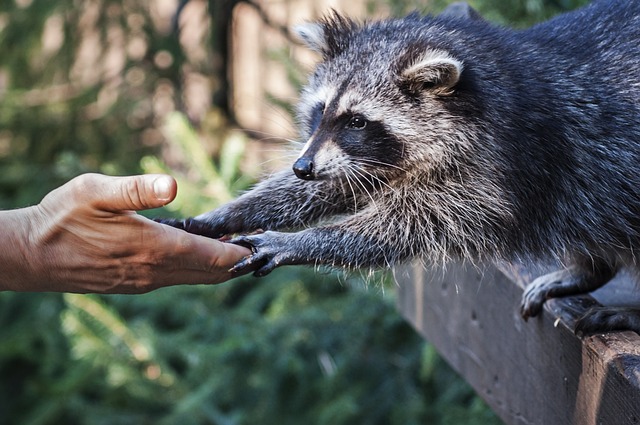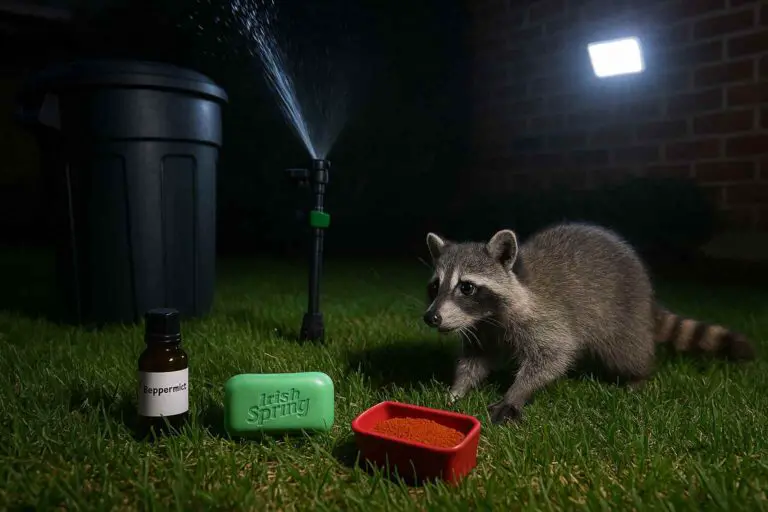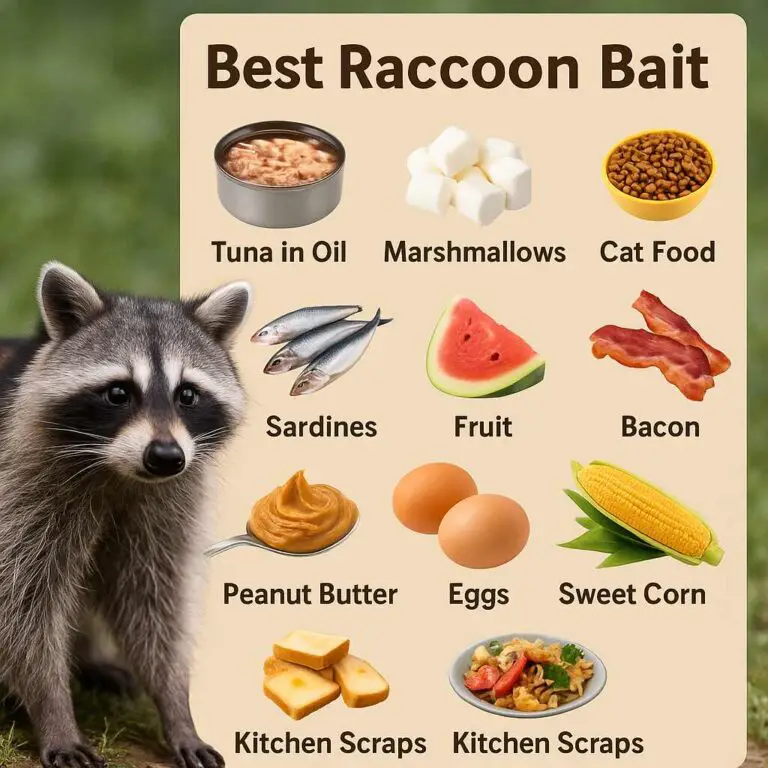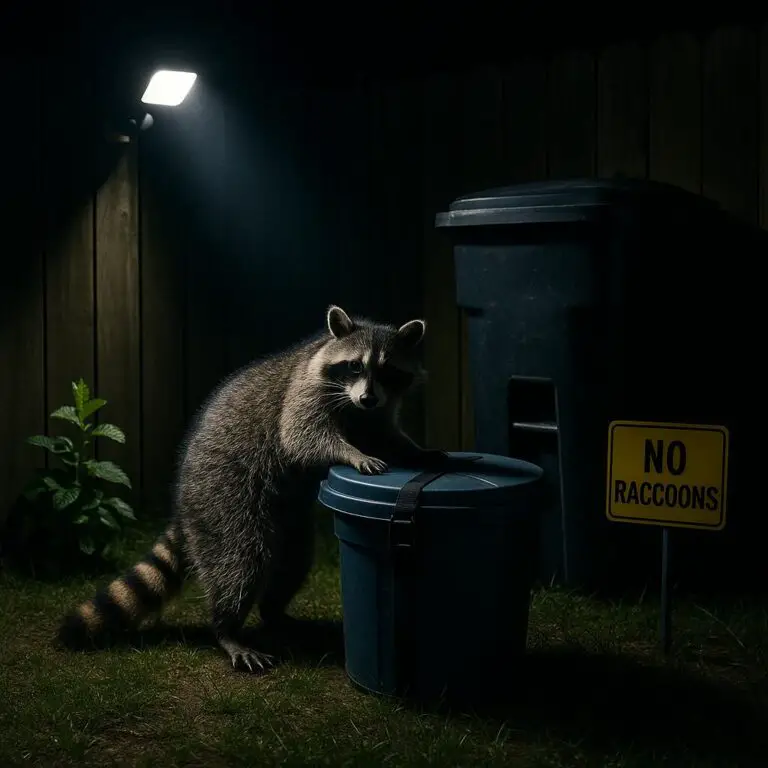One evening, as I was sipping tea on my porch, a curious raccoon with those iconic black-rimmed eyes paid me a visit. It was a moment that sparked my curiosity about these enigmatic creatures and set me on a quest to uncover the truth about whether raccoons can truly become our domestic pals. Can raccoons be domesticated?
Raccoons can’t be domesticated like dogs or cats due to their strong wild instincts. While some raise them from a young age, they often retain these instincts, becoming unpredictable, aggressive, and challenging to manage as they grow older. Raccoons are also known carriers of diseases, such as rabies, which pose health risks to humans and other animals. Additionally, many regions have strict regulations and legal restrictions on keeping raccoons as pets due to concerns about public safety and animal welfare.
In this article, I’ll dig deep into the world of raccoons, starting with their biology and natural habitat. I’ll uncover the irresistible allure of raccoons as potential pets and navigate the legal maze surrounding their ownership.
I’ll also share stories of people who have dared to bring raccoons into their homes, the challenges they faced, and the heartwarming success stories that emerged. Along the way, I’ll also consider the ethical implications of domesticating raccoons and explore alternative ways to connect with these critters while keeping their wild spirit intact.
Let’s get started!
Understanding Raccoons
Raccoons are fascinating creatures, known for their distinctive appearance, intelligence, and adaptability. To understand raccoons better, we can delve into various aspects of their biology, behavior, and ecological role.
- Physical Characteristics: Raccoons (Procyon lotor) are medium-sized mammals characterized by their iconic black mask-like facial markings and bushy-ringed tails. They have a pointed snout, dexterous front paws with five digits that resemble hands, and sharp claws. Raccoons vary in size, with adults typically weighing between 8 to 20 pounds, and their fur can range from gray to brown, depending on their habitat.
- Habitat and Range: Raccoons are highly adaptable and can thrive in various environments, including forests, wetlands, urban areas, and suburbs. They are native to North America but have been introduced to other regions, such as Europe and Asia. Their adaptability to different habitats has contributed to their success as a species.
- Behavioral Patterns: Raccoons are primarily nocturnal animals, which means they are most active during the night. They have keen senses of smell and touch, enabling them to locate food easily. Raccoons are omnivores, consuming a wide range of foods, including fruits, vegetables, small mammals, insects, and even scavenging from trash cans.
- Social Structure: Raccoons are typically solitary animals but can form loose social groups, especially during the breeding season. Adult males are generally more solitary, while females and their offspring may form maternal groups. They communicate through a variety of vocalizations, including chittering, growling, and hissing.
- Reproduction and Offspring: Raccoons usually mate in late winter or early spring. After a gestation period of about 63 days, females give birth to a litter of typically 2 to 5 kits, although litters of up to 7 have been observed. The kits are born blind and helpless, and the mother cares for them in a den until they are old enough to venture out.
- Intelligence and Problem Solving: Raccoons are renowned for their intelligence. They are skilled problem solvers and can manipulate objects, such as opening latches and unlocking containers, to access food. This intelligence has allowed them to thrive in urban environments where they often raid garbage cans and find food sources.
- Predators and Threats: While raccoons are opportunistic feeders and have few natural predators, they face threats from humans, domestic dogs, and vehicles. Additionally, diseases like rabies, distemper, and parasites can impact raccoon populations.
- Conservation Status: Raccoons are considered a species of least concern by the International Union for Conservation of Nature (IUCN) due to their adaptable nature and wide distribution. However, localized populations can be affected by habitat destruction and urbanization.
- Role in Ecosystems: Raccoons play a vital role in ecosystems by helping to control insect populations and dispersing seeds through their dietary habits. They are also known to scavenge carrion, helping to clean up dead animals and reduce disease risks.
- Human Interaction: Raccoons often come into contact with humans in urban and suburban areas. This interaction can lead to conflicts, such as property damage and the spread of diseases. It’s essential for humans to take measures to coexist peacefully with raccoons, such as securing trash cans and avoiding feeding them.
Understanding raccoons involves appreciating their unique characteristics, behaviors, and ecological roles. While these animals can be intriguing and even charming, it’s crucial to remember that they are wild creatures and should be observed and respected from a distance in their natural habitats.
The Appeal of Raccoons as Pets
Raccoons, with their distinctive masked faces and playful nature, have long intrigued people as potential pets. However, it’s essential to understand that while these creatures may seem charming and fascinating, they are not typical domesticated animals, and keeping them as pets presents several challenges and ethical considerations.
- Adorable Appearance: Raccoons are undeniably cute. Their endearing mask-like facial markings, tiny hands, and bushy tails make them highly appealing to many people. This physical charm often leads individuals to consider the idea of having a raccoon as a pet.
- Curious and Playful Behavior: Raccoons are incredibly intelligent and curious animals. They are known for their problem-solving abilities and adaptability. This innate curiosity and playfulness can be quite endearing to potential pet owners, as raccoons often exhibit behaviors that mimic those of mischievous toddlers.
- Bonding Potential: Some individuals believe that they can form strong bonds with raccoons. While it is true that raccoons can develop a level of trust with humans, it’s crucial to remember that they are wild animals and may not exhibit the same kind of loyalty and affection as domesticated pets like dogs or cats.
- Unique Pet Experience: Owning a raccoon as a pet offers a unique and exotic experience. The novelty of having a non-traditional pet can be enticing for some, as it sets them apart from the usual cat or dog owner.
- Educational Value: Raccoons can be excellent educational tools, especially for those interested in wildlife and animal behavior. Owning a raccoon can provide insights into their natural instincts, social structures, and habitat preferences, contributing to a greater understanding of wildlife conservation.
- Potential Companionship: Some people who live in areas with abundant raccoon populations might be drawn to the idea of adopting an orphaned or injured raccoon as a form of companionship. In such cases, people may see themselves as caregivers or rescuers.
- Raccoons as Service Animals: In very rare cases, individuals with specific disabilities have considered raccoons as service animals. While raccoons are not typically suitable for this role, the notion of having an unconventional service animal may appeal to some.
It’s essential to note that owning a raccoon as a pet is not recommended for several reasons:
- Wild Nature: Raccoons are wild animals with instincts and behaviors that are fundamentally different from domesticated pets. Their unpredictable nature can lead to challenges in training and socializing them.
- Legal Restrictions: Many regions have strict laws and regulations governing the ownership of raccoons as pets. It is often illegal to keep them without special permits, and obtaining these permits can be challenging.
- Health Risks: Raccoons can carry diseases that can be transmitted to humans, such as rabies and roundworm. Their bites and scratches can also cause serious infections.
- Ethical Concerns: Keeping a raccoon as a pet may be seen as unethical because it removes them from their natural habitat, disrupts their natural behaviors, and can lead to long-term harm to the animals.
- Abandonment Issues: Raccoons can live for up to 20 years in captivity, making them a long-term commitment. Many well-intentioned owners eventually find themselves unable to meet the raccoon’s needs and may release them into the wild, where they often struggle to survive.
While the appeal of raccoons as pets is understandable, it is crucial to consider the ethical, legal, and practical implications of keeping them in captivity. Instead of attempting to domesticate raccoons, it is generally better to appreciate these remarkable creatures from a safe and respectful distance in their natural habitats or through ethical wildlife education and conservation efforts.
Can Raccoons Really Be Domesticated?
The prospect of domesticating raccoons is a topic that has intrigued some individuals over the years. However, it’s essential to examine the complexities and challenges associated with this idea, as raccoons are fundamentally wild animals with unique traits that make domestication difficult.
- Wild Instincts and Behaviors: Raccoons are wild creatures with deeply ingrained instincts and behaviors that have evolved over millions of years. These instincts are challenging to override through domestication. Unlike dogs and cats, which have undergone thousands of years of selective breeding to adapt to human lifestyles, raccoons have not undergone a similar process.
- Inherent Wildness: Domestication typically involves breeding animals for specific traits, such as tameness and adaptability to human environments. Raccoons have not been selectively bred for these traits, so they retain their inherent wildness. This wildness manifests in their unpredictable behavior, including aggression and territoriality.
- Complex Social Structure: Raccoons have complex social structures in the wild, often consisting of loose family groups and solitary males. Attempting to domesticate them can disrupt their natural social behaviors, causing stress and behavioral issues for the animals.
- Disease Risks: Raccoons are known carriers of diseases that can be transmitted to humans, including rabies. These diseases pose serious health risks for both the raccoon and the potential owner. Maintaining the health and well-being of a raccoon in captivity can be a significant challenge.
- Legal and Ethical Considerations: In many regions, keeping raccoons as pets is subject to strict legal regulations, including permitting requirements. These regulations exist to protect the welfare of the animals and public health. Ethical concerns also surround the idea of keeping wild animals as pets, as it often involves removing them from their natural habitats and disrupting their natural behaviors.
- Lack of Domestication Success: Historically, attempts to domesticate raccoons have met with limited success. Even when raised from a very young age by humans, raccoons often exhibit wild behaviors as they mature. They can become aggressive, destructive, and difficult to manage as they reach adulthood.
- Longevity and Commitment: Raccoons can live up to 20 years in captivity, making them a long-term commitment. Many individuals who acquire raccoons as pets underestimate the challenges of caring for them over their lifespan. This often results in abandonment or improper care.
- Alternative Education and Conservation Approaches: Instead of attempting to domesticate raccoons, there are alternative ways to appreciate and learn about these animals. Wildlife education programs, rehabilitation centers, and conservation initiatives provide opportunities to interact with raccoons ethically while contributing to their conservation.
While the idea of domesticating raccoons may be appealing to some, it is not a practical or ethical endeavor. As I said before raccoons are wild animals with unique needs and behaviors that are best suited to their natural environments. Attempting to keep raccoons as pets can lead to numerous challenges, including legal issues, health risks, and ethical concerns. Instead of trying to domesticate raccoons, individuals interested in these animals should focus on ethical ways to observe, learn about, and appreciate them while respecting their wild nature.
Stories of Domesticated Raccoons
The notion of domesticated raccoons has intrigued people for generations, leading to rare but captivating accounts of individuals who have attempted to form close bonds with these wild animals. While these stories may appear heartwarming and endearing, they also underscore the complexities and challenges associated with keeping raccoons as pets.
Pumpkin the Raccoon: Pumpkin the Raccoon became an internet sensation with her Instagram account, where her owner documented her daily life. Pumpkin was rescued as a baby after being abandoned by her mother and was raised by a family in the Bahamas. Her owners emphasized that Pumpkin was not a pet but rather a wild animal in need of care. Despite their best efforts to provide a loving home, Pumpkin exhibited behaviors consistent with her wild instincts, such as curiosity and a love for foraging.
Rebecca Dmytryk and Dillie the Deer: While not a raccoon, Dillie the Deer’s story is similar in nature. Dillie was a white-tailed deer raised by wildlife rehabilitator Rebecca Dmytryk after being abandoned by her mother. Dillie’s story gained considerable media attention, and she lived a pampered life with Rebecca, forming a close bond. However, Dillie’s wild instincts never completely disappeared, and she required specialized care throughout her life. This story illustrates the challenges of raising wild animals, even under the best of circumstances.
Melanie Raccoon: Melanie the Raccoon was raised by a family in Russia after being found abandoned in the wild. Her owners documented her daily life on social media, showcasing her playful and curious nature. Melanie became a beloved member of the family, but her owners consistently stressed the importance of respecting raccoons’ wild instincts and behavior. While Melanie’s story was one of love and care, it also underscored the difficulties in caring for a wild animal that retained its innate instincts.
These stories offer a glimpse into the lives of raccoons that have been raised in domestic settings. However, it’s essential to recognize that these cases are exceptions and not the norm. Raccoons are inherently wild animals, and their complex behaviors and instincts are deeply ingrained over millions of years of evolution. Domesticating raccoons is fraught with challenges, ethical concerns, and risks. These animals often retain their wild nature, which can lead to unpredictable behaviors, territoriality, and health risks.
Furthermore, many regions have strict regulations and legal restrictions on keeping raccoons as pets due to concerns about public safety and animal welfare. Attempting to domesticate raccoons is generally discouraged by wildlife experts and organizations.
Alternatives to Domestication
While the idea of having a raccoon as a pet may be intriguing to some, it’s essential to understand the complexities and challenges of keeping these wild animals in captivity. Raccoons are not domesticated animals, and their innate behaviors and needs are best suited to their natural habitats. Instead of attempting to domesticate raccoons, there are several alternative ways to appreciate, learn about, and interact with these fascinating creatures:
- Wildlife Education Programs: Participating in wildlife education programs and visiting local wildlife rehabilitation centers or sanctuaries can provide valuable opportunities to learn about raccoons and other wildlife species. These programs often offer educational presentations, guided tours, and interactive experiences that promote a greater understanding of raccoons in their natural environment.
- Volunteer for Wildlife Rehabilitation: Consider volunteering with wildlife rehabilitation organizations that specialize in caring for injured, orphaned, or sick raccoons. These organizations rely on dedicated volunteers to help rehabilitate and release animals back into the wild. Volunteering provides a chance to contribute to wildlife conservation efforts while gaining hands-on experience.
- Support Wildlife Conservation: Supporting wildlife conservation initiatives financially or through volunteer work is an impactful way to contribute to the well-being of raccoons and other wildlife species. By protecting and preserving natural habitats, you help ensure the survival of raccoon populations and the ecosystems they inhabit.
- Ethical Photography and Observation: Observing raccoons and other wildlife in their natural habitats through ethical photography and wildlife watching can be a rewarding experience. It allows you to appreciate their natural behaviors and interactions without disrupting their lives. Be sure to maintain a respectful distance to avoid causing stress or harm to the animals.
- Promote Responsible Coexistence: In areas where raccoons and humans coexist, it’s essential to practice responsible coexistence. This includes securing trash cans to prevent raccoon foraging, avoiding feeding wild raccoons, and taking measures to prevent conflicts such as property damage. Educating your community about living harmoniously with wildlife is valuable.
- Citizen Science Projects: Participate in citizen science projects focused on raccoon research and conservation. These projects often involve collecting data on raccoon populations, behaviors, and health. By contributing to scientific research, you can help improve our understanding of raccoons and their role in ecosystems.
- Wildlife Photography and Art: Express your appreciation for raccoons through wildlife photography, art, and writing. Capturing their beauty and uniqueness in photographs or artwork can be a meaningful way to share their importance and raise awareness about their conservation needs.
- Advocate for Stronger Wildlife Protection Laws: Get involved in advocating for stronger wildlife protection laws and regulations that ensure the welfare of raccoons and other wildlife. Support legislation that addresses issues such as habitat preservation, humane treatment of animals, and responsible pet ownership.
Rather than attempting to domesticate raccoons, these alternative approaches allow individuals to connect with and appreciate these remarkable animals while respecting their wild nature.
Conclusion
In conclusion, the question of whether raccoons can be domesticated is one that has intrigued and occasionally inspired individuals who are drawn to these captivating creatures. However, this exploration of raccoons and their nature reveals that domestication is not a practical or ethical endeavor.
Raccoons, with their endearing appearances and intriguing behaviors, may seem like suitable candidates for domestication, but their inherent wildness remains deeply ingrained. These animals have evolved over millions of years to thrive in their natural habitats, and their complex behaviors, instincts, and adaptability to urban environments make them best suited to the wild.
Moreover, domesticating raccoons raises significant legal, ethical, and health concerns. Regulations are in place to protect the welfare of these animals and public safety, and close contact with raccoons can lead to disease transmission and unforeseen challenges in their long-term care.
Instead of attempting to domesticate raccoons, it is more responsible and rewarding to explore alternative avenues. Engaging in wildlife education, volunteering for wildlife rehabilitation, supporting conservation efforts, and advocating for responsible coexistence with raccoons and other wildlife are meaningful ways to appreciate and protect these remarkable creatures.
In short, raccoons are best appreciated and admired in their natural habitats, where they contribute to the balance of ecosystems and offer opportunities for us to observe their wild and fascinating behaviors. By respecting their wild nature and engaging in ethical and educational activities, we can ensure the well-being of raccoons and contribute to their conservation while enriching our own understanding of the natural world.








